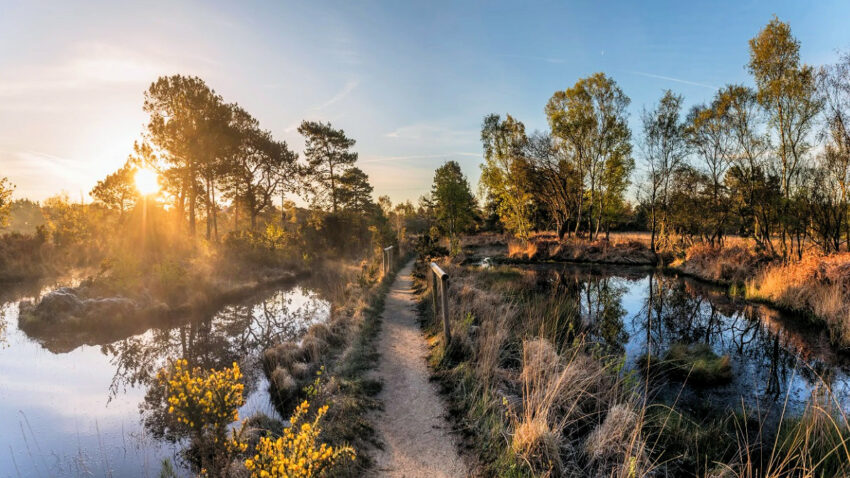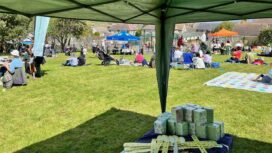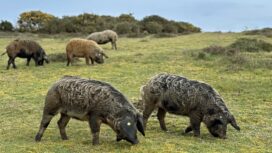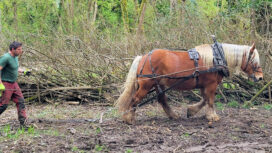BBC’s Winterwatch team is back broadcasting live from RSPB Arne in Dorset, featuring the destruction caused by the worst winter storms in years on wildlife and the environment across Purbeck.
Ahead of a four night run for Winterwatch on BBC Two from Tuesday 16th January 2024, the National Trust has issued a stark warning that global warming will bring a lasting change to the face of Purbeck and affect everyone.

The BBC Winterwatch 2024 team – from left Iolo Williams, Michaela Strachan, Gillian Burke and Chris Packham
Snakes found frozen to death
Already in 2024, snakes have been found frozen to death having come out of hibernation too early due tp the winter sun, spring plants are out in full flower and rare birds are showing signs of early nesting with a real threat that their nests could be washed away by another winter storm.
Winterwatch cameras are expected to film in Studland Bay and contrast the scene with footage filmed in June 2023 where they explored a seagrass meadow. It will show that nearly two decades of erosion has occurred in a matter of months.
Storm Ciarán, which swept into Purbeck in November 2023, caused coastline damage in Swanage and Studland with fierce tidal waves.
Storm Henk, which arrived in January 2024, brought an inch of rain in just a couple of hours which caused flooding in Corfe Castle, major road damage in Swanage, as well as erosion to beach paths in Studland.
The signs of damage are still very clear as Chris Packham and Michaela Strachan return to the UK’s first super national nature reserve to present Winterwatch looking at local wildlife, including sika deer, badgers, red squirrels and sea eagles.

The sika deer at RSPB Arne are likely to be among the stars of the show this year
Change in the weather is more exaggerated
Warning that some usual winter visitors will be missing, Chris Packham said:
“At this time of year we get an enormous influx of waders and waterfowl from further north in Europe. Poole Harbour, Brownsea Lagoon, and the estuary areas around Arne itself will be filled full of those migrant birds.
“But we probably won’t see some species which 20 years ago, 30 or 40 years ago would have been quite common in Purbeck because it would have been much colder further north in Europe, but it isn’t this year. So that will have an impact and we’ll be able to discuss that as well.”
But the birds are not the only change to the normal wildlife scene of Purbeck as the impact of the changing seasonal weather patterns in England and beyond become more and more exaggerated every year.
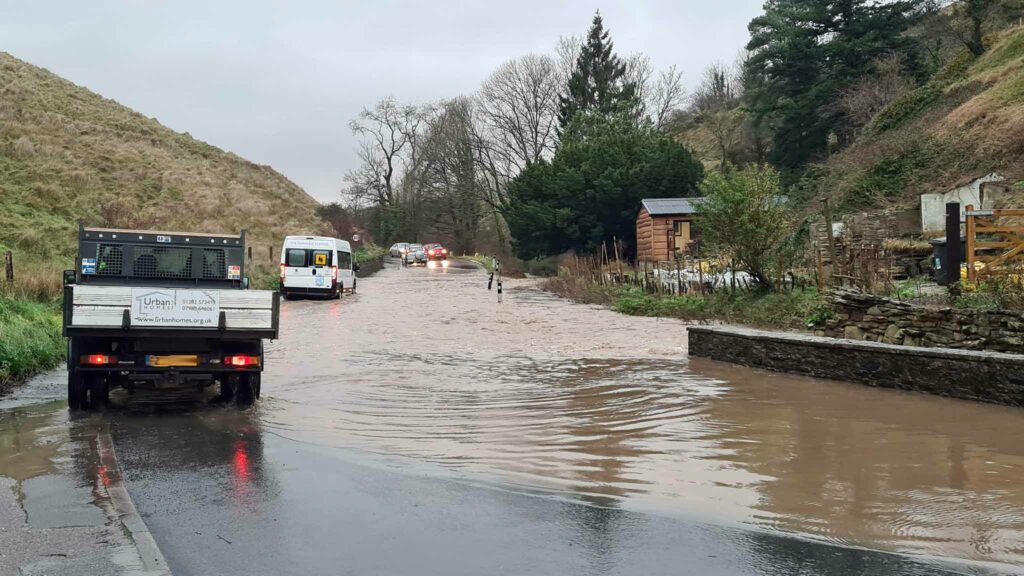
Storm Henk brought such heavy rain that Corfe Castle flooded due to watercourses bursting their banks
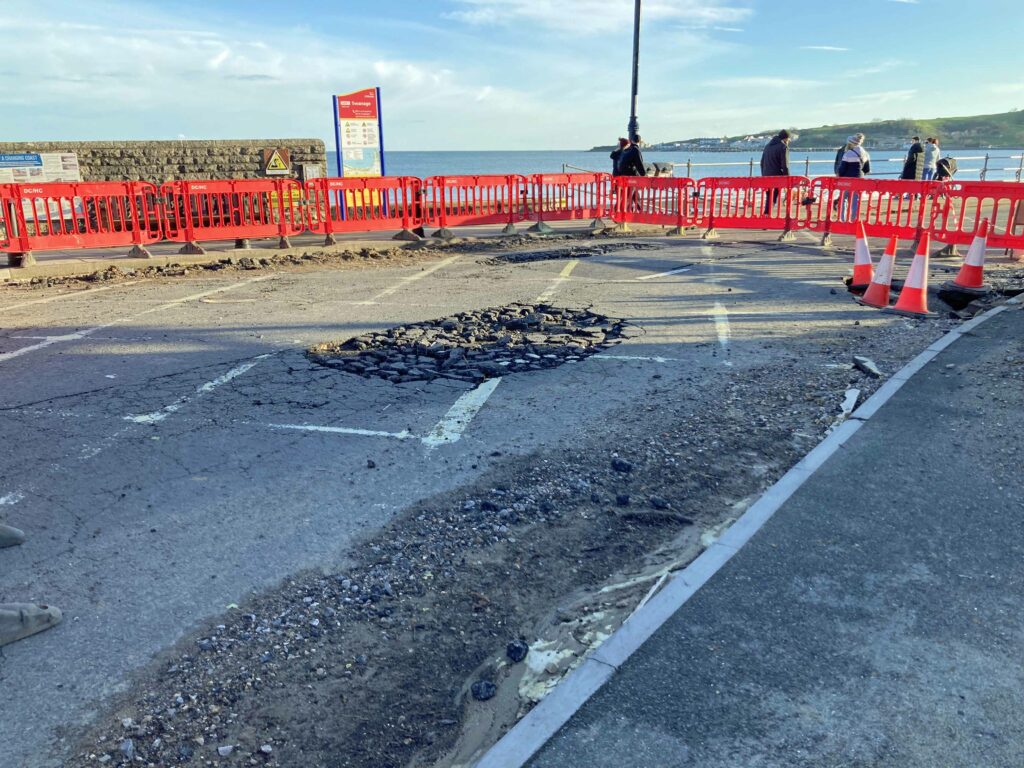
Damage caused to Shore Road in Swanage, following Storm Henk
Species don’t have time to adapt
David Brown, lead ecologist for the National Trust in Purbeck, said:
“Details will change from year to year but the long term trends are becoming more obvious, while visible local impacts are bigger and more frequent with every passing year.
“One of the biggest problems is things getting out of synch – I saw a hawthorn in full flower before the start of January which is months before its time, and if you are an invertebrate whose entire lifecycle revolves around waking up in spring and feeding on hawthorn, then you are doomed.
“Things are changing at such a pace that species often don’t have the time to adapt. We saw smooth snakes out into late November in 2023 when they should be hibernating a good month before. They can exist in climates where there are milder winters, but they can’t suddenly adapt to that.”

Storm Henk not only destroyed paths at Middle Beach in Studland, but also took out the subsoil
Creatures confused by the sudden changes
David Brown added:
“We had pretty mild conditions this last week, so lots of species think it is still autumn, or spring, and then we face a sudden cold snap which will freeze reptiles to death – they get confused by the sudden changes.
“Some of the earliest and rarest nesting birds like woodlark are already singing and making territories in our heathlands, but the storms we had last week would have washed any woodlark nests away. If we get another sudden deluge this winter, it could wash out an entire year of productivity for those birds.
“Amphibians will be starting to move back into the water in January and thinking of spawning, but if they invest all of their energy in spawning now and we get another Storm Henk in two weeks time it will wash all that spawn away.”
The National Trust is also faced with the problem of damage caused to historical buildings and infrastructure caused by worsening winter storms – not to mention hotter summers with the threat of drought and fires, such as those seen at the height of 2022.

Storm damage at Shep’s Hollow, Swanage, following the latest storms
Two significant weather events
National Trust general manager for Purbeck, Tracey Churcher, added:
“Over the last few months we have had two significant weather events in Purbeck, Storm Ciaran which had extreme coastal impact at Swanage and Studland, followed by Storm Henk where we had an excessive amount of rainfall in a very short time and both left very visible scars.
“For example, paths at the coast that have been in situ for 20 years were washed out to the depth of a metre – it wasn’t just the path, it was the subsoil too, because of the sheer volume of water and the force of it.
“In Purbeck last week the appalling weather affected everybody, whether it was roads shut through flooding or whether back gardens turned into a quagmire.
“The damage to Swanage is very, very visible – just take a look at the damage to Shore Road. Swanage is an urban beach as opposed to Studland which is a natural landscape, but they are both being impacted.”

A popular picnic spot next to the Corfe River by the castle was demolished by the floods
“We are all in this together”
Tracey Churcher added:
“Last week, climate change suddenly became everyone’s problem, a shared experience, and I personally think in a way that is helpful for humanity.
“It was just shocking the amount of rain that fell in a short time during Storm Henk and it did affect everybody.
“We are all in this together, we have to think how we are going to adapt and have honest and sensible conversations about what the future looks like. It might not be the same because we are going to have to adapt and change is hard.”
The National Trust has already begun to repair damage where possible, such as the access to South Beach to support the cafe and allow access there, although at Middle Beach an engineer will need to assess the cliff structure for safety before anything can be done.
But work on a wider scheme to mitigate flooding in future is just beginning as the National Trust starts to restore natural mires on Purbeck heathland, blocking ditches so that when water falls on the heath it stays there for longer rather than washing out into Poole Harbour straight away.
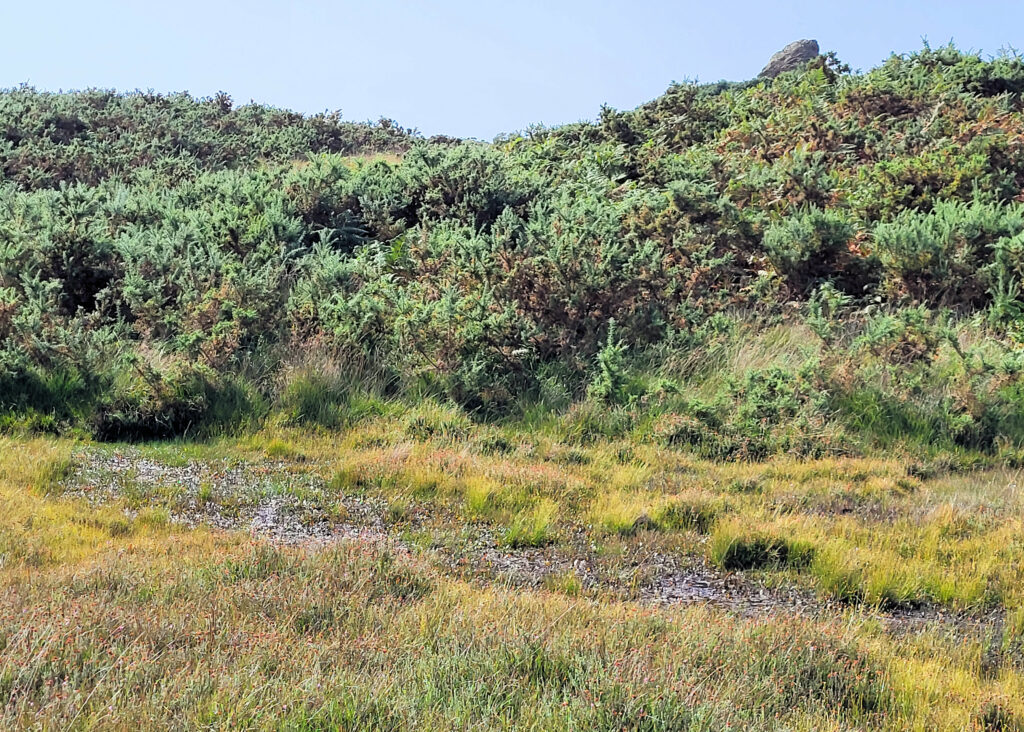
Mires are being restored at Agglestone to help the land retain water following heavy rain
Work to restore natural water courses
David Brown said:
“The last couple of weeks gave even more urgency and justification to the work we are doing to restore more natural water courses.
“Even five years ago we had very few farmers wanting to restore wetlands, but that has changed drastically and everyone recognises now that if you change streams into drainage it causes problems downstream.
“Retaining water in the landscape also provides some resilience to fire risk when it becomes very dry in summer. Water is clearly a very good thing in summer for nature and for humans and will stop the land browning so quickly, keeping it a little more lush and green.
“Government policy is changing towards that too – last week they announced the new subsidies to countryside stewardship, to incentivise farmers not to farm right up to the edge of the stream channels but to restore buffer zones around wetlands.
“It is very good, positive news. We can’t stop the amount of rain that falls, but we can at least have some influence over the negative impacts it can have.”
Further information
- Watch BBC Winterwatch on BBC2 from 8 pm on Tuesday 16th January 2024 and afterwards on BBC iPlayer
- Follow live cameras from RSPB Arne on the Winterwatch website
- More about the National Trust on its website
